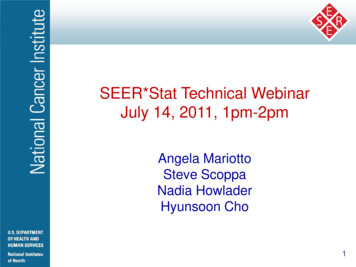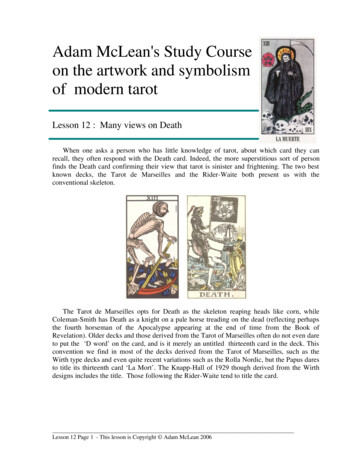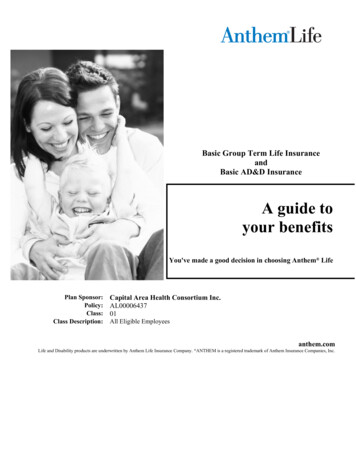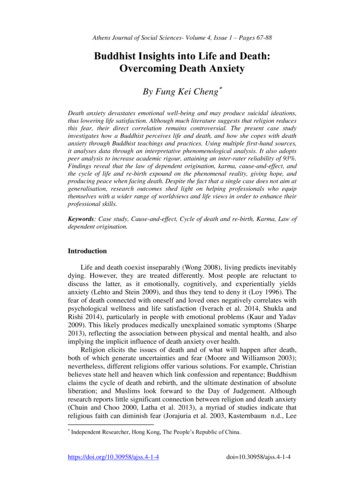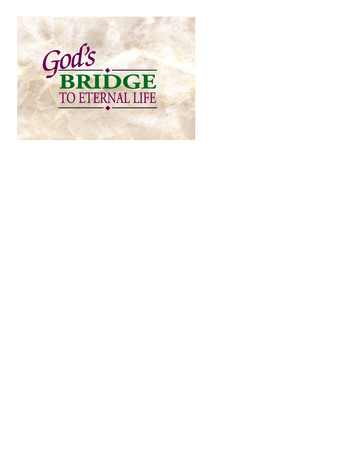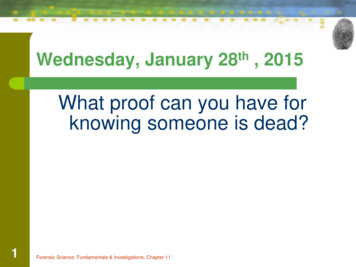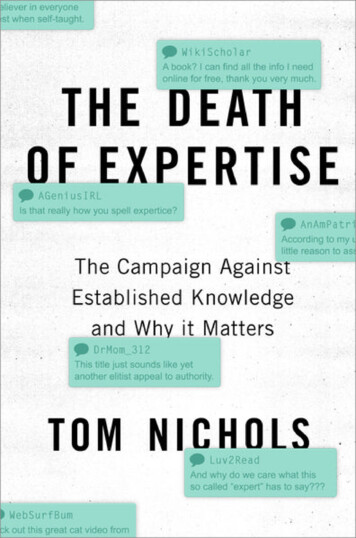
Transcription
iTHE DEATH OF EXPERTISE
ii
iiiTHE DEATH OF EXPERTISEThe Campaign against Established Knowledgeand Why It MattersTom Nichols1
iv1Oxford University Press is a department of the University of Oxford. It furthersthe University’s objective of excellence in research, scholarship, and educationby publishing worldwide. Oxford is a registered trade mark of Oxford UniversityPress in the UK and certain other countries.Published in the United States of America by Oxford University Press198 Madison Avenue, New York, NY 10016, United States of America. Oxford University Press 2017All rights reserved. No part of this publication may be reproduced, stored ina retrieval system, or transmitted, in any form or by any means, without theprior permission in writing of Oxford University Press, or as expressly permittedby law, by license, or under terms agreed with the appropriate reproductionrights organization. Inquiries concerning reproduction outside the scope of theabove should be sent to the Rights Department, Oxford University Press, at theaddress above.You must not circulate this work in any other formand you must impose this same condition on any acquirer.Library of Congress Cataloging-in-Publication DataNames: Nichols, Tom, 1960- author.Title: The death of expertise : the campaign against established knowledgeand why it matters / Tom Nichols.Description: New York, NY : Oxford University Press, [2017] Includes bibliographical references.Identifiers: LCCN 2016037219 ISBN 9780190469412Subjects: LCSH: Information society—Political aspects. Knowledge, Theoryof—Political aspects. Knowledge, Sociology of. Expertise—Political aspects. Education, Higher—Political aspects. Internet—Political aspects.Classification: LCC HM851 .N54 2017 DDC 303.48/33—dc23LC record available at https://lccn.loc.gov/20160372191 3 5 7 9 8 6 4 2Printed by Sheridan Books, Inc., United States of America
vForLynn Marie NicholsandHope Virginia NicholsExpert wife and peerless daughter
vi
viiCONTENTSPrefaceixIntroduction: The Death of Expertise1. Experts and Citizens2. How Conversation Became Exhausting3. Higher Education: The Customer Is Always Right4. Let Me Google That for You: How UnlimitedInformation Is Making Us Dumber5. The “New” New Journalism, and Lots of It6. When the Experts Are WrongConclusion: Experts and Democracy105134170209NotesIndex239249vii1134070
viii
ixPREFACE“The death of expertise” is one of those phrases that grandlyannounces its own self- importance. It’s a title that risks alienatinga lot of people before they even open the book, almost daring thereader to find a mistake in it somewhere just to take the author downa peg. I understand that reaction, because I feel much the same wayabout such sweeping pronouncements. Our cultural and literary lifeis full of premature burials of everything: shame, common sense,manliness, femininity, childhood, good taste, literacy, the Oxfordcomma, and so on. The last thing we all need is one more encomiumfor something we know isn’t quite dead.While expertise isn’t dead, however, it’s in trouble. Something isgoing terribly wrong. The United States is now a country obsessedwith the worship of its own ignorance. It’s not just that people don’tknow a lot about science or politics or geography; they don’t, butthat’s an old problem. And really, it’s not even a problem, insofar aswe live in a society that works because of a division of labor, a system designed to relieve each of us of having to know about everything. Pilots fly airplanes, lawyers file lawsuits, doctors prescribeix
xP refacemedication. None of us is a Da Vinci, painting the Mona Lisa in themorning and designing helicopters at night. That’s as it should be.No, the bigger problem is that we’re proud of not knowing things.Americans have reached a point where ignorance, especially of anything related to public policy, is an actual virtue. To reject the adviceof experts is to assert autonomy, a way for Americans to insulate theirincreasingly fragile egos from ever being told they’re wrong aboutanything. It is a new Declaration of Independence: no longer dowe hold these truths to be self- evident, we hold all truths to be self- evident, even the ones that aren’t true. All things are knowable andevery opinion on any subject is as good as any other.This isn’t the same thing as the traditional American distastefor intellectuals and know- it- alls. I’m a professor, and I get it: mostpeople don’t like professors. When I began my teaching career nearlythree decades ago, it was at a college not far from my hometown, andso I would drop in now and then to say hello and visit a small tavernowned by my brother. One evening, after I left, a patron turned to mybrother and said, “He’s a professor, huh? Well, he seems like a goodguy anyway.” If you’re in my profession, you get used to that.But that’s not why I wrote this book. Intellectuals who get outraged over zingers about the uselessness of intellectuals shouldfind a different line of work. I’ve been a teacher, a political adviser,a subject-matter expert for both government and private industry,and a commenter on various media. I’m used to people disagreeingwith me; in fact, I encourage it. Principled, informed arguments are asign of intellectual health and vitality in a democracy.Rather, I wrote this because I’m worried. We no longer have thoseprincipled and informed arguments. The foundational knowledge ofthe average American is now so low that it has crashed through thefloor of “uninformed,” passed “misinformed” on the way down, andis now plummeting to “aggressively wrong.” People don’t just believedumb things; they actively resist further learning rather than let gox
xiP refaceof those beliefs. I was not alive in the Middle Ages, so I cannot say itis unprecedented, but within my living memory I’ve never seen anything like it.That’s not to say that this is the first time I’ve ever thoughtabout this subject. Back in the late 1980s, when I was working inWashington, DC, I learned how quickly people in even casual conversation would immediately instruct me in what needed to be donein any number of areas, especially in my own areas of arms controland foreign policy. (As usual, it was what “they” should do, as in “theyought to .”) I was young and not yet a seasoned expert, but I wasastonished at the way people who did not have the first clue aboutthose subjects would confidently direct me on how best to makepeace between Moscow and Washington.To some extent, this was understandable. Politics invites discussion. And especially during the Cold War, when the stakes wereglobal annihilation, people wanted to be heard. I accepted that thiswas just part of the cost of doing business in the public policy world.Over time, I found that other specialists in various policy areas hadthe same experiences, with laypeople subjecting them to ill- informeddisquisitions on taxes, budgets, immigration, the environment, andmany other subjects. If you’re a policy expert, it goes with the job.In later years, however, I started hearing the same stories fromdoctors. And from lawyers. And from teachers. And, as it turns out,from many other professionals whose advice is usually not contradicted easily. These stories astonished me: they were not aboutpatients or clients asking sensible questions, but about those samepatients and clients actively telling professionals why their advice waswrong. In every case, the idea that the expert knew what he or she wasdoing was dismissed almost out of hand.Worse, what I find so striking today is not that people dismissexpertise, but that they do so with such frequency, on so many issues,and with such anger. Again, it may be that attacks on expertise arexi
xiiP refacemore obvious due to the ubiquity of the Internet, the undisciplinednature of conversation on social media, or the demands of the twenty- four- hour news cycle. But there is a self- righteousness and fury to thisnew rejection of expertise that suggest, at least to me, that this isn’tjust mistrust or questioning or the pursuit of alternatives: it is narcissism, coupled to a disdain for expertise as some sort of exercise inself- actualization.This makes it all the harder for experts to push back and to insistthat people come to their senses. No matter what the subject, theargument always goes down the drain of an enraged ego and endswith minds unchanged, sometimes with professional relationships oreven friendships damaged. Instead of arguing, experts today are supposed to accept such disagreements as, at worst, an honest differenceof opinion. We are supposed to “agree to disagree,” a phrase now usedindiscriminately as little more than a conversational fire extinguisher.And if we insist that not everything is a matter of opinion, that somethings are right and others are wrong well, then we’re just beingjerks, apparently.It’s possible, I suppose, that I am merely a symptom of generational change. I grew up in the 1960s and 1970s, an era when perhapstoo much deference was paid to experts. These were the heady dayswhen America was at the forefront of not only science but also international leadership. My parents were knowledgeable but uneducatedpeople who, like most Americans, assumed that the same people whoput a man on the moon were probably right about most other important things. I was not raised in an environment of utter obedience toauthority, but in general, my family was typical in trusting that thepeople who worked in specialized fields, from podiatry to politics,knew what they were doing.As critics of expertise rightly point out, in those days we weretrusting the people who landed Neil Armstrong in the Sea ofTranquility, but who also landed a lot of less famous American menxii
xiiiP refacein places like Khe Sanh and the Ia Drang Valley in Vietnam. The public’s trust, both in experts and political leaders, was not only misplaced but abused.Now, however, we’ve gone in the other direction. We do not havea healthy skepticism about experts: instead, we actively resent them,with many people assuming that experts are wrong simply by virtueof being experts. We hiss at the “eggheads”— a pejorative comingback into vogue— while instructing our doctors about which medications we need or while insisting to teachers that our children’sanswers on a test are right even if they’re wrong. Not only is everyone as smart as everyone else, but we all think we’re the smartestpeople ever.And we couldn’t be more wrong.I have many people to thank for their assistance with this book,and many more to absolve from any association with its views orconclusions.I first wrote a post called “The Death of Expertise” for my personal blog, The War Room, back in 2013. That post was noticed bySean Davis at The Federalist, and he contacted me about writing it upas an article. I am grateful to Sean and to The Federalist for giving thepiece a home, where it was soon read by well over a million peoplefrom around the world. David McBride at Oxford University Pressthen saw the article, and in turn he contacted me about turning itsmain thesis into a book. His editorial guidance and advice were keyto fleshing out the argument at greater length, and I am grateful tohim and to Oxford, as well as to the anonymous reviewers of the proposal, for bringing the book to fruition.I am fortunate to work at the US Naval War College, and manyof my colleagues there, including David Burbach, David Cooper,Steve Knott, Derek Reveron, and Paul Smith, among others, provided comments and material. But the opinions and conclusions inxiii
xivP refacethis book are mine: they do not in any way represent the views of anyother institution, nor of any agency of the US government.Several friends and correspondents in various professions werekind enough to provide comments, read chapters, or to provideanswers to a variety of questions outside my area of expertise, including Andrew Facini, Ron Granieri, Tom Hengeveld, Dan Kaszeta,Kevin Kruse, Rob Mickey, Linda Nichols, Brendan Nyhan, WillSaletan, Larry Sanger, John Schindler, Josh Sheehan, Robert Trobich,Michael Weiss, Salena Zito, and especially Dan Murphy and JoelEngel. I owe special thanks to David Becker, Nick Gvosdev, and PaulMidura for their comments on several drafts of the manuscript.I am very grateful to the Harvard Extension School, for not onlythe opportunity to teach in the program, but also the many excellentstudent research assistants that Extension provides to its faculty. KateArline was an invaluable assistant on this project: she fielded evensome of the oddest queries quickly and with aplomb. (Want to knowhow many fast- food joints have opened in America since 1959? Katecan find out.) Any of the factual errors or misinterpretations in thisbook, however, are mine and mine alone.Writing a book can be a wonderful and engaging experience forthe author, but less so for the people around him. My wife, Lynn, andmy daughter, Hope, were as patient as ever with me while I workedon this volume, and I owe them a significant debt of gratitude for putting up with me while I was writing. This book is dedicated to bothof them, with love.Finally, I must thank the people who assisted me with this bookbut who, for obvious reasons, wish to remain anonymous. I am grateful to the many medical professionals, journalists, lawyers, educators,policy analysts, scientists, scholars, military experts, and others whoshared their experiences and contributed their stories to this book.I could not have written it without them.xiv
xvP refaceI hope in some way this book helps them and other experts in theirwork. But in the end, the clients of all professionals are the people ofthe society in which they live, and so I especially hope this book helpsmy fellow citizens in better using and understanding the experts onwhom we all rely. More than anything, I hope this work contributesto bridging the rift between experts and laypeople that in the longrun threatens not only the well- being of millions of Americans, butalso the survival of our democratic experiment.xv
xvi
1IntroductionThe Death of ExpertiseThere is a cult of ignorance in the United States, and there alwayshas been. The strain of anti- intellectualism has been a constantthread winding its way through our political and cultural life, nurtured by the false notion that democracy means that “my ignoranceis just as good as your knowledge.”Isaac AsimovIn the early 1990s, a small group of “AIDS denialists,” including aUniversity of California professor named Peter Duesberg, arguedagainst virtually the entire medical establishment’s consensus thatthe human immunodeficiency virus (HIV) was the cause of AcquiredImmune Deficiency Syndrome. Science thrives on such counterintuitive challenges, but there was no evidence for Duesberg’s beliefs,which turned out to be baseless. Once researchers found HIV, doctors and public health officials were able to save countless livesthrough measures aimed at preventing its transmission.The Duesberg business might have ended as just another quirkytheory defeated by research. The history of science is littered withsuch dead ends. In this case, however, a discredited idea nonethelessmanaged to capture the attention of a national leader, with deadlyresults. Thabo Mbeki, then the president of South Africa, seized on1
2T he D eath of E xpertisethe idea that AIDS was caused not by a virus but by other factors,such as malnourishment and poor health, and so he rejected offersof drugs and other forms of assistance to combat HIV infection inSouth Africa. By the mid- 2000s, his government relented, but notbefore Mbeki’s fixation on AIDS denialism ended up costing, by theestimates of doctors at the Harvard School of Public Health, wellover three hundred thousand lives and the births of some thirty- fivethousand HIV- positive children whose infections could have beenavoided.1 Mbeki, to this day, thinks he was on to something.Many Americans might scoff at this kind of ignorance, butthey shouldn’t be too confident in their own abilities. In 2014, theWashington Post polled Americans about whether the United Statesshould engage in military intervention in the wake of the 2014Russian invasion of Ukraine. The United States and Russia are former Cold War adversaries, each armed with hundreds of long- rangenuclear weapons. A military conflict in the center of Europe, righton the Russian border, carries a risk of igniting World War III, withpotentially catastrophic consequences. And yet only one in sixAmericans— and fewer than one in four college graduates— couldidentify Ukraine on a map. Ukraine is the largest country entirely inEurope, but the median respondent was still off by about 1,800 miles.Map tests are easy to fail. Far more unsettling is that this lack ofknowledge did not stop respondents from expressing fairly pointedviews about the matter. Actually, this is an understatement: the public not only expressed strong views, but respondents actually showedenthusiasm for military intervention in Ukraine in direct proportionto their lack of knowledge about Ukraine. Put another way, people whothought Ukraine was located in Latin America or Australia were themost enthusiastic about the use of US military force.2These are dangerous times. Never have so many people had somuch access to so much knowledge and yet have been so resistant tolearning anything. In the United States and other developed nations,2
3I ntrod u ctionotherwise intelligent people denigrate intellectual achievement andreject the advice of experts. Not only do increasing numbers of laypeople lack basic knowledge, they reject fundamental rules of evidence and refuse to learn how to make a logical argument. In doingso, they risk throwing away centuries of accumulated knowledge andundermining the practices and habits that allow us to develop newknowledge.This is more than a natural skepticism toward experts. I fear weare witnessing the death of the ideal of expertise itself, a Google- fueled,Wikipedia- based, blog- sodden collapse of any division betweenprofessionals and laypeople, students and teachers, knowers andwonderers— in other words, between those of any achievement in anarea and those with none at all.Attacks on established knowledge and the subsequent rash ofpoor information in the general public are sometimes amusing.Sometimes they’re even hilarious. Late- night comedians have madea cottage industry of asking people questions that reveal their ignorance about their own strongly held ideas, their attachment to fads,and their unwillingness to admit their own cluelessness about current events. It’s mostly harmless when people emphatically say, forexample, that they’re avoiding gluten and then have to admit thatthey have no idea what gluten is. And let’s face it: watching people confidently improvise opinions about ludicrous scenarios likewhether “Margaret Thatcher’s absence at Coachella is beneficial interms of North Korea’s decision to launch a nuclear weapon” nevergets old.When life and death are involved, however, it’s a lot less funny.The antics of clownish antivaccine crusaders like actors Jim Carreyand Jenny McCarthy undeniably make for great television or for afun afternoon of reading on Twitter. But when they and other uninformed celebrities and public figures seize on myths and misinformation about the dangers of vaccines, millions of people could once3
4T he D eath of E xpertiseagain be in serious danger from preventable afflictions like measlesand whooping cough.The growth of this kind of stubborn ignorance in the midst ofthe Information Age cannot be explained away as merely the resultof rank ignorance. Many of the people who campaign against established knowledge are otherwise adept and successful in their dailylives. In some ways, it is all worse than ignorance: it is unfounded arrogance, the outrage of an increasingly narcissistic culture that cannotendure even the slightest hint of inequality of any kind.By the “death of expertise,” I do not mean the death of actualexpert abilities, the knowledge of specific things that sets some people apart from others in various areas. There will always be doctorsand diplomats, lawyers and engineers, and many other specialistsin various fields. On a day- to- day basis, the world cannot functionwithout them. If we break a bone or get arrested, we call a doctor ora lawyer. When we travel, we take it for granted that the pilot knowshow airplanes work. If we run into trouble overseas, we call a consular official who we assume will know what to do.This, however, is a reliance on experts as technicians. It is not adialogue between experts and the larger community, but the use ofestablished knowledge as an off- the- shelf convenience as needed andonly so far as desired. Stitch this cut in my leg, but don’t lecture meabout my diet. (More than two- thirds of Americans are overweight.)Help me beat this tax problem, but don’t remind me that I shouldhave a will. (Roughly half of Americans with children haven’t bothered to write one.) Keep my country safe, but don’t confuse me withthe costs and calculations of national security. (Most US citizens donot have even a remote idea of how much the United States spendson its armed forces.)All of these choices, from a nutritious diet to national defense,require a conversation between citizens and experts. Increasingly, itseems, citizens don’t want to have that conversation. For their part,4
5I ntrod u ctionthey’d rather believe they’ve gained enough information to makethose decisions on their own, insofar as they care about making anyof those decisions at all.On the other hand, many experts, and particularly those in theacademy, have abandoned their duty to engage with the public. Theyhave retreated into jargon and irrelevance, preferring to interact witheach other only. Meanwhile, the people holding the middle groundto whom we often refer as “public intellectuals”— I’d like to think I’mone of them— are becoming as frustrated and polarized as the rest ofsociety.The death of expertise is not just a rejection of existing knowledge.It is fundamentally a rejection of science and dispassionate rationality, which are the foundations of modern civilization. It is a sign, asthe art critic Robert Hughes once described late twentieth- centuryAmerica, of “a polity obsessed with therapies and filled with distrustof formal politics,” chronically “skeptical of authority” and “prey tosuperstition.” We have come full circle from a premodern age, in whichfolk wisdom filled unavoidable gaps in human knowledge, througha period of rapid development based heavily on specialization andexpertise, and now to a postindustrial, information- oriented worldwhere all citizens believe themselves to be experts on everything.Any assertion of expertise from an actual expert, meanwhile, produces an explosion of anger from certain quarters of the Americanpublic, who immediately complain that such claims are nothing morethan fallacious “appeals to authority,” sure signs of dreadful “elitism,”and an obvious effort to use credentials to stifle the dialogue requiredby a “real” democracy. Americans now believe that having equal rightsin a political system also means that each person’s opinion about anything must be accepted as equal to anyone else’s. This is the credo ofa fair number of people despite being obvious nonsense. It is a flatassertion of actual equality that is always illogical, sometimes funny,and often dangerous. This book, then, is about expertise. Or, more5
6T he D eath of E xpertiseaccurately, it is about the relationship between experts and citizens ina democracy, why that relationship is collapsing, and what all of us,citizens and experts, might do about it.The immediate response from most people when confronted withthe death of expertise is to blame the Internet. Professionals, especially,tend to point to the Internet as the culprit when faced with clients andcustomers who think they know better. As we’ll see, that’s not entirelywrong, but it is also too simple an explanation. Attacks on establishedknowledge have a long pedigree, and the Internet is only the mostrecent tool in a recurring problem that in the past misused television,radio, the printing press, and other innovations the same way.So why all the fuss? What exactly has changed so dramatically forme to have written this book and for you to be reading it? Is this reallythe “death of expertise,” or is this nothing more than the usual complaints from intellectuals that no one listens to them despite theirself- anointed status as the smartest people in the room? Maybe it’snothing more than the anxiety about the masses that arises amongprofessionals after each cycle of social or technological change. Ormaybe it’s just a typical expression of the outraged vanity of overeducated, elitist professors like me.Indeed, maybe the death of expertise is a sign of progress. Educatedprofessionals, after all, no longer have a stranglehold on knowledge.The secrets of life are no longer hidden in giant marble mausoleums,the great libraries of the world whose halls are intimidating even tothe relatively few people who can visit them. Under such conditionsin the past, there was less stress between experts and laypeople, butonly because citizens were simply unable to challenge experts in anysubstantive way. Moreover, there were few public venues in which tomount such challenges in the era before mass communications.Participation in political, intellectual, and scientific life until theearly twentieth century was far more circumscribed, with debatesabout science, philosophy, and public policy all conducted by a small6
7I ntrod u ctioncircle of educated males with pen and ink. Those were not exactly theGood Old Days, and they weren’t that long ago. The time when mostpeople didn’t finish high school, when very few went to college, andwhen only a tiny fraction of the population entered professions is stillwithin living memory of many Americans.Social changes only in the past half century finally broke down oldbarriers of race, class, and sex not only between Americans in generalbut also between uneducated citizens and elite experts in particular.A wider circle of debate meant more knowledge but more social friction. Universal education, the greater empowerment of women andminorities, the growth of a middle class, and increased social mobility all threw a minority of experts and the majority of citizens intodirect contact, after nearly two centuries in which they rarely had tointeract with each other.And yet the result has not been a greater respect for knowledge,but the growth of an irrational conviction among Americans thateveryone is as smart as everyone else. This is the opposite of education, which should aim to make people, no matter how smart oraccomplished they are, learners for the rest of their lives. Rather, wenow live in a society where the acquisition of even a little learning isthe endpoint, rather than the beginning, of education. And this is adangerous thing.WHAT’S AHEADIn the chapters that follow, I’ll suggest several sources of this problem,some of which are rooted in human nature, others that are unique toAmerica, and some that are the unavoidable product of modernityand affluence.In the next chapter, I’ll discuss the notion of an “expert” andwhether conflict between experts and laypeople is all that new. What7
8T he D eath of E xpertisedoes it even mean to be an expert? When faced with a tough decisionon a subject outside of your own background or experience, whomwould you ask for advice? (If you don’t think you need any advice butyour own, you’re likely one of the people who inspired me to writethis book.)In chapter 2, I’ll explore why conversation in America has becomeso exhausting not just between experts and ordinary citizens, butamong everyone. If we’re honest, we all would admit that any of uscan be annoying, even infuriating, when we talk about things thatmean a great deal to us, especially regarding beliefs and ideas towhich we’re firmly attached. Many of the obstacles to the workingrelationship between experts and their clients in society rest in basichuman weaknesses, and in this chapter we’ll start by considering thenatural barriers to better understanding before we look more closelyat the particular problems of the early twenty- first century.We all suffer from problems, for example, like “confirmationbias,” the natural tendency only to accept evidence that confirmswhat we already believe. We all have personal experiences, prejudices, fears, and even phobias that prevent us from accepting expertadvice. If we think a certain number is lucky, no mathematician cantell us otherwise; if we believe flying is dangerous, even reassurancefrom an astronaut or a fighter pilot will not allay our fears. Andsome of us, as indelicate as it might be to say it, are not intelligentenough to know when we’re wrong, no matter how good our intentions. Just as we are not all equally able to carry a tune or draw astraight line, many people simply cannot recognize the gaps in theirown knowledge or understand their own inability to construct alogical argument.Education is supposed to help us to recognize problems like“confirmation bias” and to overcome the gaps in our knowledge sothat we can be better citizens. Unfortunately, the modern Americanuniversity, and the way students and their parents treat it as a generic8
9I ntrod u ctioncommodity, is now part of the problem. In chapter 3 I’ll discuss whythe broad availability of a college education— paradoxically— ismaking many people think they’ve become smarter when in factthey’ve gained only an illusory intelligence bolstered by a degreeof dubious worth. When students become valued clients insteadof learners, they gain a great deal of self- esteem, but precious littlekn
medication. None of us is a Da Vinci, painting the Mona Lisa in the morning and designing helicopters at night. That’s as it should be. No, the bigger problem is that we’re proud of not knowing things. Americans have reached a point where ignorance, especially of any-thing related to


